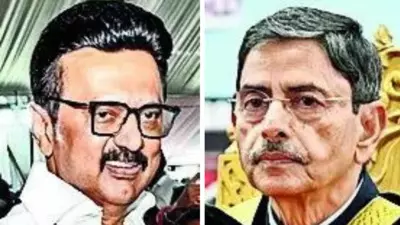The Clash of Authority: Tamil Nadu Governor and the State Government's Tug-of-War

In a dramatic escalation of tensions between Tamil Nadu's Governor R N Ravi and the state government, accusations have flown thick and fast following a controversial Vice-Chancellors conference. The Governor, addressing a gathering of academic leaders, claimed that state university Vice-Chancellors were coerced not to attend his conference. This unfolding saga has spotlighted the fraught relationship between state authority and educational governance in Tamil Nadu.
The backdrop to this conflict involves Governor R N Ravi's assertion that Vice-Chancellors from state-run universities were warned by the Tamil Nadu government against participating in a two-day conference at Raj Bhavan, which aimed to foster discussions around higher education. The Governor expressed his disappointment, emphasizing that the participation of these Vice-Chancellors is crucial for constructive dialogue. However, the absence of state university representatives was met with sharp rebuke from state officials, who labeled the conference as illegal and the Governor's actions as politically motivated.
The Tamil Nadu higher education minister, Govi Chezhian, vehemently defended the state's position, suggesting that the Governor's initiative was a blatant disregard for legal boundaries. Chezhian pointed out that the Supreme Court had recently empowered the state government to appoint Vice-Chancellors, thereby rendering the conference's legitimacy questionable. This tension raises significant questions about the role of a Governor in state affairs, particularly regarding educational institutions.
The confrontation between the Governor and the state government has far-reaching implications for educational governance in Tamil Nadu. The fact that Vice-Chancellors from central and deemed-to-be universities attended the conference while their state counterparts did not may signal a rift in the educational framework. The absence of state university leaders could hinder collaborative efforts necessary for evolving higher education policies, which are crucial for adapting to the contemporary demands of academia and job markets.
Despite the tensions, both sides need to recognize the importance of collaboration in addressing the challenges facing higher education. Ravi emphasized the need for innovation and leadership among the youth, noting how advancements in technology, especially in artificial intelligence, are reshaping education and employment. If both the Governor and the state government can set aside their differences, they could work together to create a more robust educational framework that prepares the youth for future challenges.
As this situation unfolds, it is imperative for all stakeholders—government officials, educators, and students—to engage in constructive dialogue. The future of Tamil Nadu's higher education system hinges on the ability of its leaders to collaborate effectively. The ongoing conflict between the Governor and the state government serves as a reminder of the delicate balance of power in educational governance. If they can find common ground, the potential for innovation and growth in Tamil Nadu’s educational landscape is immense.
